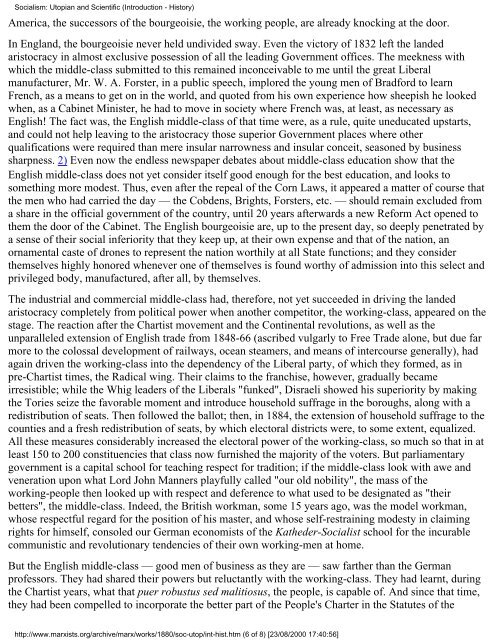Socialism: Utopian and Scientific - MIA
Socialism: Utopian and Scientific - MIA
Socialism: Utopian and Scientific - MIA
Create successful ePaper yourself
Turn your PDF publications into a flip-book with our unique Google optimized e-Paper software.
<strong>Socialism</strong>: <strong>Utopian</strong> <strong>and</strong> <strong>Scientific</strong> (Introduction - History)America, the successors of the bourgeoisie, the working people, are already knocking at the door.In Engl<strong>and</strong>, the bourgeoisie never held undivided sway. Even the victory of 1832 left the l<strong>and</strong>edaristocracy in almost exclusive possession of all the leading Government offices. The meekness withwhich the middle-class submitted to this remained inconceivable to me until the great Liberalmanufacturer, Mr. W. A. Forster, in a public speech, implored the young men of Bradford to learnFrench, as a means to get on in the world, <strong>and</strong> quoted from his own experience how sheepish he lookedwhen, as a Cabinet Minister, he had to move in society where French was, at least, as necessary asEnglish! The fact was, the English middle-class of that time were, as a rule, quite uneducated upstarts,<strong>and</strong> could not help leaving to the aristocracy those superior Government places where otherqualifications were required than mere insular narrowness <strong>and</strong> insular conceit, seasoned by businesssharpness. 2) Even now the endless newspaper debates about middle-class education show that theEnglish middle-class does not yet consider itself good enough for the best education, <strong>and</strong> looks tosomething more modest. Thus, even after the repeal of the Corn Laws, it appeared a matter of course thatthe men who had carried the day — the Cobdens, Brights, Forsters, etc. — should remain excluded froma share in the official government of the country, until 20 years afterwards a new Reform Act opened tothem the door of the Cabinet. The English bourgeoisie are, up to the present day, so deeply penetrated bya sense of their social inferiority that they keep up, at their own expense <strong>and</strong> that of the nation, anornamental caste of drones to represent the nation worthily at all State functions; <strong>and</strong> they considerthemselves highly honored whenever one of themselves is found worthy of admission into this select <strong>and</strong>privileged body, manufactured, after all, by themselves.The industrial <strong>and</strong> commercial middle-class had, therefore, not yet succeeded in driving the l<strong>and</strong>edaristocracy completely from political power when another competitor, the working-class, appeared on thestage. The reaction after the Chartist movement <strong>and</strong> the Continental revolutions, as well as theunparalleled extension of English trade from 1848-66 (ascribed vulgarly to Free Trade alone, but due farmore to the colossal development of railways, ocean steamers, <strong>and</strong> means of intercourse generally), hadagain driven the working-class into the dependency of the Liberal party, of which they formed, as inpre-Chartist times, the Radical wing. Their claims to the franchise, however, gradually becameirresistible; while the Whig leaders of the Liberals "funked", Disraeli showed his superiority by makingthe Tories seize the favorable moment <strong>and</strong> introduce household suffrage in the boroughs, along with aredistribution of seats. Then followed the ballot; then, in 1884, the extension of household suffrage to thecounties <strong>and</strong> a fresh redistribution of seats, by which electoral districts were, to some extent, equalized.All these measures considerably increased the electoral power of the working-class, so much so that in atleast 150 to 200 constituencies that class now furnished the majority of the voters. But parliamentarygovernment is a capital school for teaching respect for tradition; if the middle-class look with awe <strong>and</strong>veneration upon what Lord John Manners playfully called "our old nobility", the mass of theworking-people then looked up with respect <strong>and</strong> deference to what used to be designated as "theirbetters", the middle-class. Indeed, the British workman, some 15 years ago, was the model workman,whose respectful regard for the position of his master, <strong>and</strong> whose self-restraining modesty in claimingrights for himself, consoled our German economists of the Katheder-Socialist school for the incurablecommunistic <strong>and</strong> revolutionary tendencies of their own working-men at home.But the English middle-class — good men of business as they are — saw farther than the Germanprofessors. They had shared their powers but reluctantly with the working-class. They had learnt, duringthe Chartist years, what that puer robustus sed malitiosus, the people, is capable of. And since that time,they had been compelled to incorporate the better part of the People's Charter in the Statutes of thehttp://www.marxists.org/archive/marx/works/1880/soc-utop/int-hist.htm (6 of 8) [23/08/2000 17:40:56]














![tyf Enf=O=n]lgg](https://img.yumpu.com/47584932/1/190x245/tyf-enfonlgg.jpg?quality=85)

